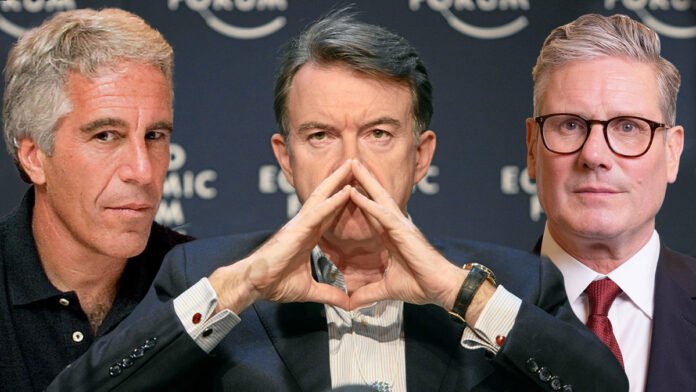The Trilateral Commission Mandelson, Epstein, Starmer
The Epstein affair resembles nothing so much as a rotten onion, each layer peeled back reveals fresh horrors, new connections, deeper corruption. The victims whose voices deserve amplification, the blackmail theories that explain so much yet prove so little, the FBI’s curious handling of evidence, the web of compromised politicians from Trump to Clinton, each represents a vital story demanding investigation. Yet to attempt comprehensive coverage would produce not clarity but confusion, not insight but information overload.
This analysis concentrates on one particular slice of that putrid bulb: the Trilateral Commission connections that bind Mandelson, Epstein, and Starmer within networks of elite power that operate beyond democratic accountability. It is a slice chosen not for sensationalism but for its immediate relevance to British governance and democratic sovereignty. The other layers, equally rotten, equally deserving of scrutiny, await their own examination. For now, we focus our gaze on the connections that matter most to understanding how power really operates in modern Britain, and why a Prime Minister’s loyalties may lie elsewhere than with the people who elected him.
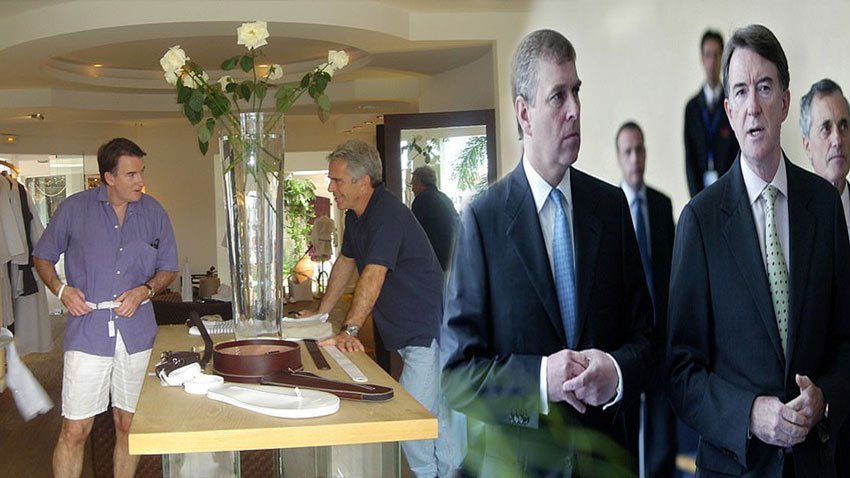
Who Does Starmer Serve? The Trilateral Commission Loyalty Test
A politician’s reputation, much like a carefully constructed house of cards, is an impossibly fragile thing. One ill-judged glance, one misplaced word, and the entire structure collapses. The public, being a weary and unforgiving landlord, has no time for structural flaws. We saw this with Angela Rayner, whose tangled tax affairs exposed the yawning chasm between her professed principles and her private conduct. But with Lord Mandelson, we witnessed something far more sinister: not a house of cards falling, but a foundation built on sand being washed away by a tide of uncomfortable truths.
Remember when we warned about the networks of power that operate beyond democratic scrutiny? The appointment of Lord Mandelson as US ambassador, despite his well-documented friendship with convicted sex offender Jeffrey Epstein, the Trilateral Commission connections with Mandelson, Epstein and yes, our beloved prime minister, Keir Starmer, exposed the very system Starmer perpetuates.
The emergence of fresh documents detailing Mandelson’s relationship with Epstein surprised no one who had been paying attention to the elite networks that shape global politics. A 10-page handwritten letter in which the Labour peer called Epstein his “best pal.” Supportive messages sent while Epstein was facing charges. Advice to “fight for early release.” This was not the accidental association of a man who moved in grand circles. It was the active, deliberate maintenance of a friendship with a monster.
But the true depth of Mandelson’s loyalty to Epstein emerged in emails obtained by Bloomberg News. Writing to Epstein the day before he began serving his jail sentence for soliciting sex from a minor, Mandelson declared: “I think the world of you and I feel hopeless and furious about what has happened. I can still barely understand it. It just could not happen in Britain.” In further correspondence, the future ambassador advised his paedophile friend: “Reminder. You are fighting back so you need strategy, strategy, strategy. Remember the Art of War,” referencing Sun Tzu’s book on strategic wartime planning.
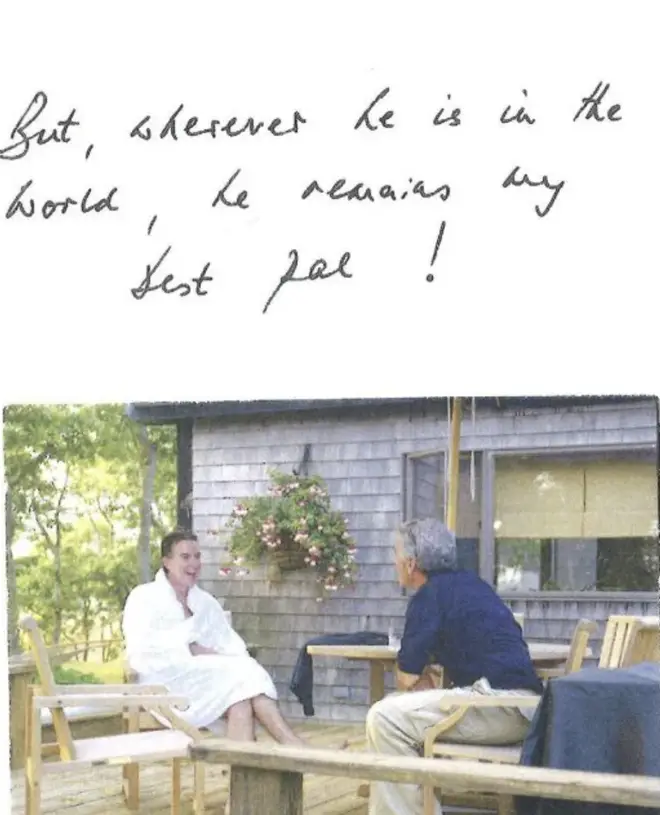
Earlier emails from 2005 revealed the casual intimacy of their relationship. “When are you going to the island at Xmas?” Mandelson asked, finishing with “What are your plans and do I fit into them? X.” This was not business networking, this was personal friendship with a man whose criminal proclivities were becoming increasingly apparent.
His excuse, that he was misled by Epstein’s “assurances of innocence,” became a transparent insult to our intelligence when set against this evidence. By 2008, when he was sending these messages, Epstein was already a convicted criminal. The red flags were not just visible; they were on fire.
No 10 stood firmly behind Mandelson on Wednesday, saying he had been fully security-checked before taking up the role and was the right person for the job. By Thursday afternoon, Starmer had sacked his former right-hand man and ambassador to Washington. The speed of this reversal, from full support to dismissal in less than 24 hours, revealed not principled decision-making but panic management in the face of public outrage.
But the Epstein connection is merely a symptom of a deeper malady, a rot that has spread through the very core of our political establishment. Mandelson is not just a politician; he is a living embodiment of the globalist, unaccountable networks that operate beyond the democratic reach of the public. He is a prominent member of the Trilateral Commission, a body founded in 1973 by David Rockefeller and Zbigniew Brzezinski to foster closer cooperation between elites in North America, Europe, and Asia. Its members are not elected representatives of the people but influential figures from business, academia, and politics.
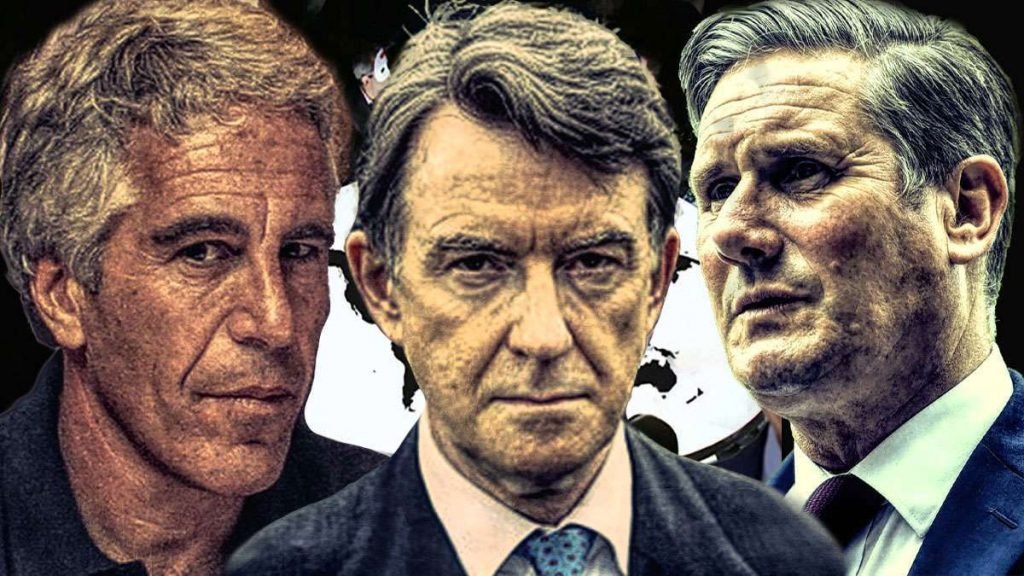
Peter Mandelson and Jeffrey Epstein were both fellows of this elite organisation, an institution whose 1975 report on the “Crisis of Democracy” revealed their true concern: not that democracy was failing, but that it was working too well, allowing ordinary citizens to make demands that threatened elite control. This organisation seeks to create a new world order of managed globalisation, divided between three trading spheres, and more concerning still, its members now occupy the highest offices of power. Friedrich Merz, Germany’s current Chancellor, and Sir Keir Starmer, Britain’s Prime Minister, both belong to this exclusive club of roughly 400 individuals who shape global policy behind closed doors. Little wonder that Starmer initially ignored all warnings about Mandelson’s associations, standing by his ambassador until public pressure became unbearable, prioritising elite solidarity over democratic accountability.
The Trilateral Commission operates through subtle instruments of soft power and legislative influence, bending global governance to serve wealth concentration and unobstructed trade flows. The organisation has produced one defining manifesto that reveals its true character: “The Crisis of Democracy: On the Governability of Democracies” (1975), authored by Michel Crozier, Samuel Huntington, and Joji Watanuki. This report, still prominently displayed on the Commission’s website, presents democracy itself as the problem requiring solution.
The document argues with chilling clarity that industrial democracies need “a greater degree of moderation in democracy” to overcome the “excess of democracy” that had emerged in the preceding decade. Most tellingly, it declares that “the effective operation of a democratic political system usually requires some measure of apathy and non-involvement on the part of some individuals and groups.” In other words, democracy works best when people don’t participate in it.
Noam Chomsky described this as one of the most revealing documents of modern elite thinking, a blueprint showing how supposed democracies are actually controlled by oligarchies who view public engagement as an obstacle to efficient governance. The Commission regards civil rights movements, trade unions, academic freedom, and democratic participation as impediments to the free flow of capital and goods.
The financial connections illuminate this web of influence. Trilateral Commission members include Larry Fink of BlackRock, the investment giant where Friedrich Merz, Germany’s current Chancellor, previously worked as chairman of BlackRock’s German operations. Jamie Dimon of JPMorgan Chase also belongs to this exclusive circle, creating a spider’s web of interlocking relationships between global finance and political power.
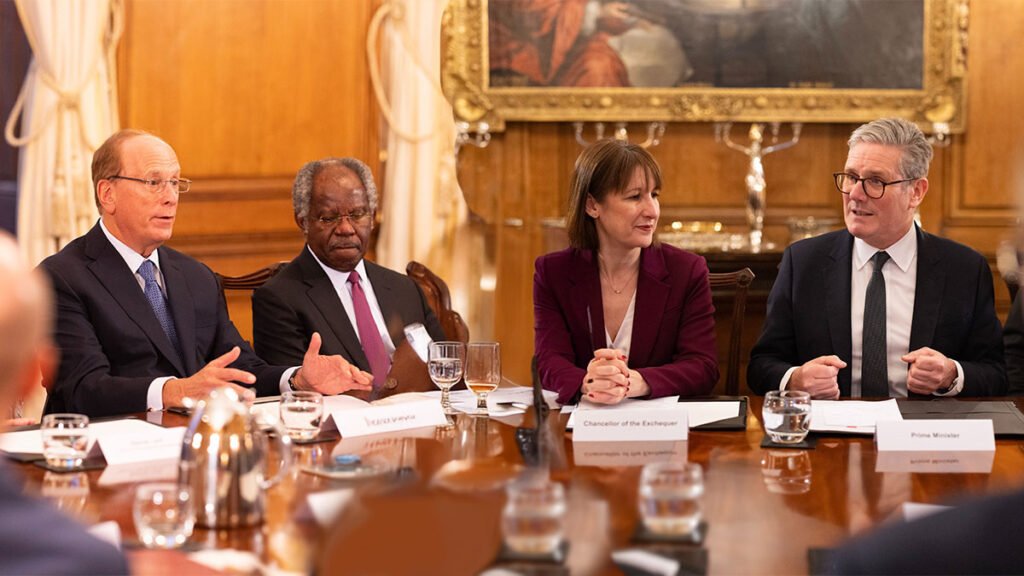
These connections become sinister when examined alongside Epstein’s financial activities and the enabling role of major financial institutions. JPMorgan Chase processed over $1 billion for Jeffrey Epstein across 15 years, despite internal concerns about his criminal status and suspicious transactions. The bank’s relationship with Epstein was orchestrated primarily through Jes Staley, a senior executive whose personal involvement went far beyond professional banking.
The depth of Staley’s relationship with Epstein emerged through court documents and investigations. In April 2022, the Wall Street Journal revealed that Staley had travelled to Little St. James, Epstein’s private island in the Caribbean, in 2009. But the true extent of their friendship became clear through email exchanges that painted a picture of ongoing social interaction even while Epstein was under house arrest.
On December 26, 2009 – while Epstein was confined to house arrest for procuring a child for prostitution, Staley wrote to him: “Fun tonight. What do we do next?????” Epstein’s reply revealed the extent of his continued operations, offering his “former DEA” and “armed” driver to collect Staley in St. Thomas, along with helicopter tours and access to his “two big marinas” and recreational facilities. Staley’s response was telling: “Arrived at your harbour. Someday, we have to do this together.”
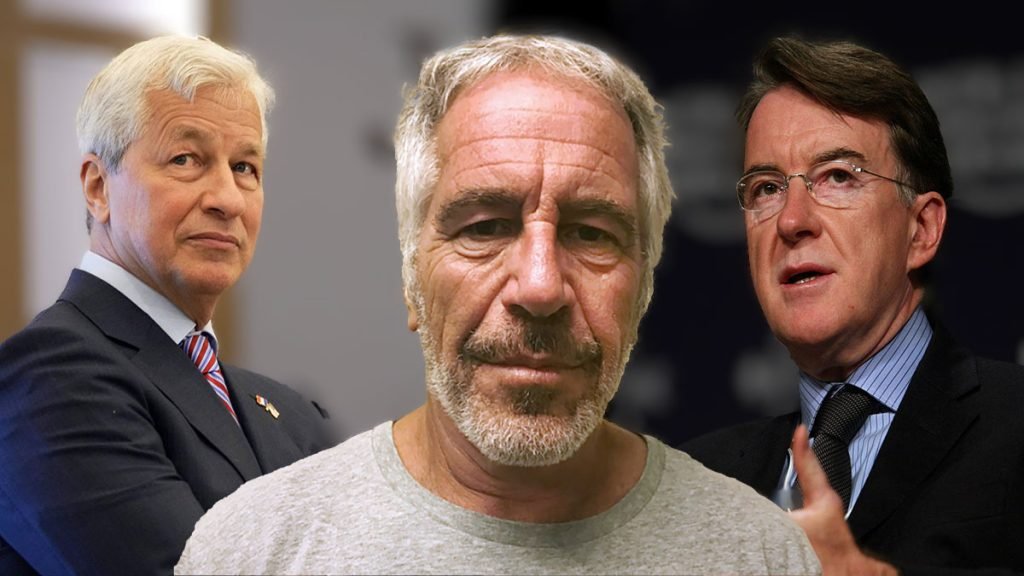
The financial institution’s complicity runs deeper than mere oversight failures. Lawsuits filed in 2023 alleged that Staley knew Epstein was trafficking women and that he personally witnessed Epstein abusing an underage girl. More damaging still, legal papers revealed that Staley and JPMorgan CEO Jamie Dimon had discussed business with Epstein, directly contradicting Dimon’s sworn testimony that he had no involvement with Epstein as a client.
Court documents exposed how compliance concerns were overridden on four occasions by JPMorgan leadership to maintain Epstein’s banking relationship, with the bank even establishing accounts for young women at his request. Internal communications showed employees repeatedly urging the bank to cease doing business with the convicted sex offender, only to be overruled by senior management who valued the profits and connections Epstein provided.
The Financial Conduct Authority’s investigation found that Staley had pushed JPMorgan to keep Epstein as a client despite human trafficking concerns, and accused him of approving misleading correspondence about their relationship. In March 2025, Staley appealed his lifetime ban from holding senior positions in the UK financial industry, claiming unfair treatment. By June 2025, he had lost his bid to overturn the ban, a rare instance of elite accountability in a system designed to protect its own.
The scandal eventually cost JPMorgan $75 million in settlements with the US Virgin Islands and victims, with the bank admitting its relationship with Epstein was a “mistake.” Yet the evidence suggests this was no oversight but systematic enablement, the bank “knowingly facilitated, sustained and concealed” Epstein’s frequent cash withdrawals to pay trafficked women while profiting from his network.
This is the true face of Trilateral Commission governance: a system where democratic accountability becomes subordinate to financial flows, where known criminals retain banking services because of their elite connections, and where public oversight is dismissed as dangerous excess requiring “moderation.” When Commission members occupy the highest offices in multiple nations simultaneously while their financial networks enable systematic abuse, we witness not international cooperation but the institutionalisation of oligarchic rule that operates beyond any democratic constraint.
Starmer was forced to remove Mandelson, but on the face of it, we must ask how he was ever appointed in the first place. Mandelson’s career makes his initial appointment even more inexplicable. This is a man who has resigned from Cabinet positions twice, who was instrumental in undermining Jeremy Corbyn through the People’s Vote campaign, who has spent decades advancing the interests of global capital rather than British workers. That Starmer chose him as ambassador revealed everything about this government’s true priorities.
The Epstein connections matter not because of salacious interest in elite social networks, but because they expose the fundamental question of loyalty in modern politics. They reveal the seamless web connecting financial power and political influence, with figures like Mandelson operating as conduits between both worlds. More troubling still, they illuminate our Prime Minister’s own allegiances and raise a stark question: does Starmer’s loyalty lie with the British people who elected him, or with the Trilateral Commission that elevated him?
This is where accountability becomes crucial. Multiple media outlets, including Labour Heartlands, warned about Mandelson’s appointment and its implications. Yet Starmer pressed ahead, dismissing democratic concern in favour of elite solidarity. When powerful men maintain friendships with convicted sex offenders, when they offer support during criminal proceedings, when they dismiss such behaviour as mere social awkwardness, they demonstrate unfitness for public trust.
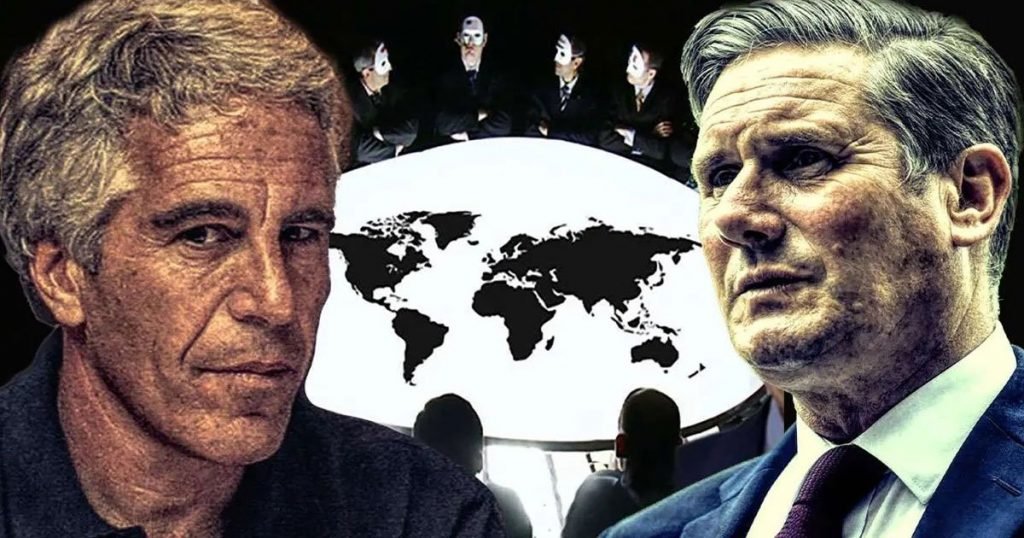
But when a Prime Minister belongs to the same secretive organisation that fostered such relationships, when he initially prioritises institutional loyalty over public accountability, his own judgment must be questioned.
The medieval knights’ oath demanded an answer to one simple question: “Who do you serve?” Starmer’s delayed response to the Mandelson crisis provides a clear answer, and it reveals a leader whose first instinct is to protect the network rather than the nation. Only overwhelming media coverage and public pressure forced his hand. His initial unwavering support for Mandelson, despite mounting evidence of compromising associations, revealed where his true loyalties lay: not with the democratic mandate that brought him to power, but with the transnational elite networks that shaped his rise.
The broader implications for Labour’s credibility are severe. A party that claims to champion working people while initially defending representatives who befriend sex offenders and belong to secretive elite organisations has lost any moral authority to govern. When your Prime Minister belongs to what one critic described as “a body dedicated to promoting corporate power,” while your ambassador spent more time defending Jeffrey Epstein than fighting for British workers, questions about priorities become unavoidable.
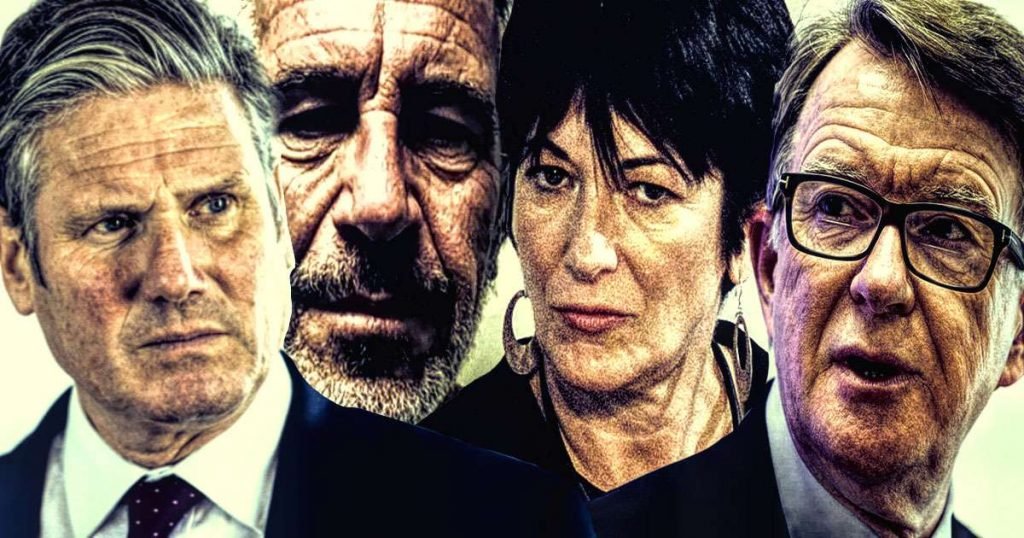
Starmer’s initial refusal to remove Mandelson demonstrated the same institutional loyalty that has corrupted British politics for decades. Rather than serving the public interest, his first instinct was to serve the interests of a political class that views democratic accountability as an inconvenient obstacle to efficient global governance. This is not the change promised in 2024; it is business as usual dressed up in progressive rhetoric.
Critics have long accused the Trilateral Commission of promoting “a global consensus among the international ruling classes in order to manage international affairs in the interest of the financial and industrial elites.” Republican Senator Barry Goldwater once described it as “a skilful, coordinated effort to seize control and consolidate the four centres of power: political, monetary, intellectual, and ecclesiastical.”
The story continues to unfold, and the public’s hunger for truth grows stronger. Until the so-called Epstein list is revealed, connections will continue to be made, some real, some speculative, as people attempt to understand the true nature of elite power networks. In this quest for truth, we must remember Orwell’s warning:
“The Party told you to reject the evidence of your eyes and ears. It was their final, most essential command.” We must not allow elite gaslighting to convince us that what we see clearly, the web of connections, the patterns of loyalty, the prioritisation of network over nation, is somehow imaginary or conspiratorial.
The chickens have indeed come home to roost. Mandelson’s removal shows that media and public pressure can still force accountability, but the question remains whether anyone in government has the courage to acknowledge that the coop itself is rotten, and that real change requires dismantling the networks of elite power that make such scandals not just possible, but inevitable.
Support Independent Journalism Today
Our unwavering dedication is to provide you with unbiased news, diverse perspectives, and insightful opinions. We're on a mission to ensure that those in positions of power are held accountable for their actions, but we can't do it alone. Labour Heartlands is primarily funded by me, Paul Knaggs, and by the generous contributions of readers like you. Your donations keep us going and help us uphold the principles of independent journalism. Join us in our quest for truth, transparency, and accountability – donate today and be a part of our mission!
Like everyone else, we're facing challenges, and we need your help to stay online and continue providing crucial journalism. Every contribution, no matter how small, goes a long way in helping us thrive. By becoming one of our donors, you become a vital part of our mission to uncover the truth and uphold the values of democracy.
While we maintain our independence from political affiliations, we stand united against corruption, injustice, and the erosion of free speech, truth, and democracy. We believe in the power of accurate information in a democracy, and we consider facts non-negotiable.
Your support, no matter the amount, can make a significant impact. Together, we can make a difference and continue our journey toward a more informed and just society.
Thank you for supporting Labour Heartlands
